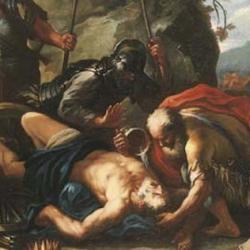When King Nahash of Ammon dies, David sends his condolences to his son Hanun (1 Chronicles 19). Nahash had shown love-and-loyalty (hesed) to David, so David returns hesed (v. 2). Hanun doesn’t believe it, and the princes (apparently young advisors) stoke up his suspicions (v. 3). David isn’t sending messengers to honor his father but to spy out the land; David obviously thinks that Ammon is vulnerable during its interregnum, that Hanun is just a boy (“tennis balls, my liege”), that he can leverage Nahash’s death to Israel’s advantage.
Hanun has to prove his manhood, and he does it the old-fashioned way, by humiliating other men. Hair is a glory-crown; a man’s hair signifies his manhood. So Hanun shaves David’s messengers. 2 Samuel 10 specifies that Hanun shaves half of the messengers’ beards. The Chronicler is less specific: Hanun simply “shaved them” (v. 4), perhaps from head to toe-hairs. Shaved, the men are feminized, stripped of their male glory. Clothing is also a glory, and for royal messengers clothing would no doubt somehow signify their high status. Hanun strips that glory too, cutting the messengers’ robes up to the hips and sending them back to David bare-bummed (perhaps again a feminization). Hanun can’t believe David the warrior-king of Israel could show kindness and political love. He treats David’s royal messengers as slaves and POWs.
It’s the kind of incident that, still in our high-minded world, becomes an international cause celebre. It’s the kind of things that can spark a shooting war.
Insulted, his hesed greeted with contempt, David . . . does nothing. He sends the messengers to Jericho to wait for their hair to grow back (v. 5), but nothing more. There are no war preparations in Israel, no retribution. David does not return insult for insult, evil for evil. He has had long practice in bearing humiliations and being unjustly mistreated. It’s the story of his life, at least during Saul’s reign.
Hanun could let it go too. After all, he is one-up on David. But he anticipates that David will punish Ammon for the insult, so he hires Aramean mercenaries and besieges Medeba (1 Chronicles 19:6–7), a city in the tribal area of Reuben (Joshua 13:9). This is no longer an insult but an attack, and David responds by sending Joab to liberate the city (1 Chronicles 19:9–10). Joab wins, David defeats the Arameans in a second battle, and the upshot is an Israelite conquest of the Ammonite city of Rabbah (20:1–3). The story ends with David wearing Hanun’s crown. What Hanun fears, happens, but only because of his own folly. If he had received David’s messengers, if he had not attacked Medeba, the crown would still be his.
David’s kindness and restraint is a trap for the Ammonites. Operating by the code of warrior cultures—defend honor above everything, defend it by shaming others and, if necessary, by killing – they cannot make sense of David’s behavior. David’s un-heroism makes them stumble; they fall into the hole they dug for David.
Meanwhile, David returns kindness for kindness, curbs his passion for revenge, lets things go, and ends up with another crown in his collection. Somebody is defending David’s honor, and but it’s not David.
An assignment: Allegorize and, having allegorized, tropologize.















